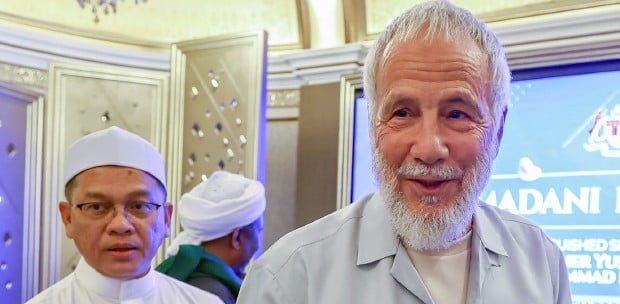THERE are assumptions that Islam is fanatical, harmful, and prone to violence. The tendency is to see Muslims as felons who compel others from different cultures to accept Islam.
Some claim Islam was spread on the point of a sword. It is a bias that, unfortunately, self-perpetuates. Is Islam a religion of peace or force? Does it condone violence, oppress those of other faiths and employ force for conversion? Was it spread on the point of a sword? Are Muslims peace-loving or violence-prone?
Besides Islam's deconstruction, many ideas, theories, philosophies, false textual interpretations are propagated. Islam is exhibited as unkind by referring to wars fought by Muslim nations.
Islam's capital punishment is presented to prove merciless intent and peace deficit, marking Muslims as non-humanitarian. Since such allegations are exceedingly harmful and deconstructive, a response based on the Quran and the Prophet's biography to clarify issues is timely.
The Arabic term "Islam" is wrongly associated with violence or force. Its literal meaning refers to submission, surrender and peaceful reconciliation, especially compliance with divine directives. Muslims adhere to the Quran and Sunnah and are required to obey these directives.
This specific obedience requires their application of "revealed law" without dissension or disorder. The Arabic word "aslim" found in the Quran means to "submit". Thus, it is peaceful submission to God without resistance, remonstrance, or rebellion.
The Arabic term "salam" means "peace". Salam is an attribute of God. This attribution as 'the source of Peace' radiates peace, security, well-being, and reassurance throughout the universe and within man's soul.
Man feels safer under God's care and protection and at peace with the world around him. Since man reflects on this attribution, he is reassured, regaining a sense of peace while extending peace to all. Islam's way of life prescribes a formula that establishes comprehensive social harmony and peace when adequately employed.
Whenever a Muslim meets another Muslim, he salutes, "Assalamu Alaykum". The hearer responds, "Wa Alaykum Assalam". Both the Arabic phrases mean "peace is on you". This compassionate and merciful mutual greeting occurs whenever they meet, a sign of wholehearted wish for sustainable peace — a noble culture manifest in Islamic civilisation.
It is a declaration of no animosity for others. Peace, goodwill, forbearance, harmony, success, well-being, and excellence are the key objectives of this Islamic greeting.
The Quran and the Prophetic literature emphasise the significance of peace and security. Since Muslims revere Prophet Muhammad's example as a pious way of living, they naturally uphold it and actualise his traditions and sayings in all aspects of their lives.
Establishing peace is, thus, of paramount importance, amounting to a prime objective that most Muslims faithfully strive to achieve in all social relations regardless of environment and circumstance.
The prophet's traditions indicate the magnanimity required of all Muslims. Hospitality is virtuous because it bridges gaps between people with differences. It is nothing less than a conscientious attempt to avoid hostilities, the cruelness of thought, enmity, and antagonism. Offering food strengthens human bonds and is why hospitality is valued in Islam.
Hence, this religion of peace universally calls for food as one of several ways to maintain social harmony via selfless generosity. After mindful attendance, greed and envy will flee when basic human needs are fulfilled.
A true Muslim is one from whom other Muslims feel secure against abuse and attack from either tongue or hand. This shows that Muslims must maintain peace by guaranteeing security and protection. However, this general formula does not mean that "others' are "deprived of security and peace.
Instead, they are secured and protected by the principle of peace inherent in the religion's self-
descriptive terms. Moreover, since Islam is essentially a religion of peace, Muslims must, therefore, engage in doing what is beneficial by commanding righteousness and by avoiding or forbidding what is malicious — all for the sake of peace and tranquillity. Therefore, force or violence must be avoided in promoting and advancing peace.
The Quran is God's revealed guidance, which advocates peaceful means in all circumstances except defence. It encourages peace even when confronted by ignorant, uncivilised, irrational, or hostile people, publicly or privately. Islam embraces moderation in everything as a fundamental principle.
Without knowing the truth, people read unreliable sources filled with interpolations and unauthentic material penned by vested-interest groups sponsored by anti-religious zealots. Hence, people who learn Islam from poisoned sources are misled and filled with negative ideas that foment discord.
Islamic doctrines exclude compulsion in matters of religion. The Scripture is categorically against forced conversion. It says: "Let there be no compulsion in religion" (Quran, 2: 256). This verse makes it transparently clear that no compulsion in religion is allowed and that no one can be forced against his/her will to convert to Islam. "Iman" (faith) must be established based on proper religious knowledge and free will. It cannot be based on coercion or force.
Further, "iman" requires firm conviction from the heart, followed by testimony. Hence, saying Islam is a religion of force, compulsion, or coercion is myth and scientific fallacy, an intellectual absurdity.
Muslims are to behave with moderation while upholding justice in human relations, especially in faith. Whosoever advances that "Islam was/is spread on the point of sword" should access genuine Islamic sources to comprehend the truth and not rely on hearsay.
Despite inhumane persecution, the Prophet graciously continued his peaceful religious activities and steadfastly propagated the divine message of Islam. The Prophet presented God's message to those who visited him in Makkah; quietly and modestly without offending communal sensitivities, honour, or prestige.
History testifies that he despatched letters to all leaders in neighbouring regions in which he peacefully and respectfully called on them to accept Islam. The Prophet permanently extended the hand of peace when disseminating the message of Islam.
Likewise, all interactions with him were peaceful in nature and form. Islam, the revealed religion of peace, required that he and his companions never proselytise with any intent of violence. They never initiated offensive attacks, assaults, expeditions, battles, or wars.
Thus, without doubt, the era of the Prophet was of peace and tranquillity that led to social stability and cohesion, followed by security and harmony. Hence, the allegation that Islam is a violence-prone religion is a myth — a concocted narrative.
The writer is a professor at the Department of Usul al-Din and Comparative Religion, International Islamic University Malaysia





